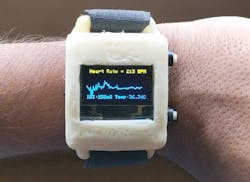Air Force asks industry to develop wearable sensors to detect fatigue and stress in warfighters, astronauts
WRIGHT-PATTERSON AFB, Ohio – U.S. Air Force researchers are asking industry to develop wearable computers and sensors to detect and counter fatigue and stress among warfighters, doctors, nurses, and first-responders.
Officials of the U.S. Air Force Research Laboratory at Wright-Patterson Air Force Base, Ohio, issued a solicitation (FA8650-22-S-5006) Friday for the Real-Time Assessment and Augmentation of Cognitive Performance in Extreme Environments project.
Mental and physical fatigue and stress are significant problems that affect the physical and mental performance of warfighters, astronauts, and medical personnel due to long-duration missions, mental exertion, and cognitive overload.
The austere environments impose unique causes of fatigue that not only limit countermeasures, but also that could become chronic, leading to reduced health and compounded stress. Military leaders today do not require physiological monitoring to identify potentially dangerous fatigue.
That's where the Real-Time Assessment and Augmentation of Cognitive Performance in Extreme Environments project comes in. This initiative seeks to develop wearable systems that continuously monitor biometrics of fatigue and stress using electrophysiological sensors and biomarkers of stress such as cortisol, DHEA-s, epinephrine, and NPY in interstitial fluid (ISF).
The project also seeks to develop wearable technologies to counter fatigue and stress while considering and addressing austere environmental challenges, resulting in wearable electronics that are low power, flexible, affordable, and manufacturable at scale.
These kinds of wearable technologies would be appropriate not only for military warfighters, but also for civil firefighters, emergency responders, astronauts, expedition crews, and medical personnel to assess, augment, and optimize mental and physical performance.
Solicitation Request: Air Force Research Laboratory, RXA, Wright-Patterson Air Force Base is soliciting white papers on the research effort described below.
Air Force researchers say they plan to spend about $23 million on this project over five years, and expect other government agencies to provide additional money after contract award.
Companies interested should submit five-page white papers online at www.grants.gov and by email at [email protected] no later than 28 Feb. 2022.
Related: Military wearable computing hits the mainstream
Submit white papers to the attention of the Air Force's Ashton Kiplinger. Those submitting promising white papers will be asked to submit full proposals.
Email technical questions or concerns to The Air Force's Lt. Suren Uswatta at [email protected], Matthew Dalton at [email protected]. Email contracting questions to Ashton Kiplinger at [email protected].
More information is online at https://sam.gov/opp/6fe8cd39b80e4490bd060425f663990f/view.

John Keller | Editor-in-Chief
John Keller is the Editor-in-Chief, Military & Aerospace Electronics Magazine--provides extensive coverage and analysis of enabling electronics and optoelectronic technologies in military, space and commercial aviation applications. John has been a member of the Military & Aerospace Electronics staff since 1989 and chief editor since 1995.

